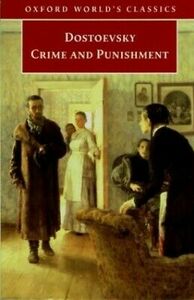Take a photo of a barcode or cover
“Your worst sin is that you have destroyed and betrayed yourself for nothing.”
(These words offer a striking comparison of Roskolnikov committing murder, but being unable to avail anything he stole, and Sonya’s prostitution)
Crime and Punishment is a comprehensive novel that deals with morality, psychology, philosophy, societal positions, and poverty- animal cruelty and alcoholism in relation to it. Although at surface level, it seems to debunk and unravel a man’s psyche after spiraling ill after a murder, it also provides keen social commentary, including on conformity and women as well. Perhaps some conversations were unnecessary but they added a cultural element, a development of the characters (of which there is no shortage of), a nuance in human interaction and nature. Not only is there a thrilling mental cat and mouse chase, reflecting Russia’s intelligence agency and politics, between a police officer and a criminal, but there is also internal and external conflict that constantly juxtaposes each other. Portraying a power game as Roskolnikov attempts to justify his actions, all the while acknowledging the complex conundrum of guilt when he is unable to do so- he may convince the world of his innocence, but he struggles to convince himself. It’s interesting how his humanity is constantly shown throughout this novel (and how sensitive a disturbed person becomes to other disturbed people), in flickers, much like Sonya who isn’t portrayed as malicious but rather similar to Roskolnikov himself, perhaps one could even go so far as to say she is symbolized as moral chastity (like of a child’s), and also raises questions of moral ambiguity- whether anyone is truly incapable of sin.
Symbolism and objects are used expressively and the author doesn't balk from religious discourse either. At times there is also a crude sort of humor, a satire and sardonic sort, in their monologues, such as evoking casual racism. Doestoevysky puts a certain weight and importance in art and literature- ironically showing the destitute former student relying on academic justification for his crimes, but, at the end, it is his relationships that push him to make decisions. Furthermore this can be seen as although the murder was premeditated, Roskalnikov forgets to lock the door, drawing attention to the effect of insanity and isolation. Also, there is a certain awe at how the author manages to introduce a character, and tie all their independent situations neatly by the end. It also questions whether prisons do more harm than good, both the mental and physical ones; suggesting there is more punishment than crime, but that all action is rewarded by consequence, especially those one cannot reverse. Roskalnikov’s frame of mind and sudden shifts in mood completely rebel the image of a rapscallion, and instead is meant to make him feel more significant and relatable (despite his superiority complex, which may have even originated from his belief in solipsism), simultaneously adding gravity to the plot, as if the situation were happening in reality. The relevancy of this novel to our current era is a testament to its timelessness, what with wars and famine unfortunately still being prevalent in today’s world.
This novel you feel a spectrum of emotions, especially through engaging characters, and the authors ability to craft a lingering, vivid scene, often using crude, but reflective, language to do so. There is no one reason for doing anything but, often, reasoning alone cannot satiate the heart, and, often, the very people that cause suffering aren't fully evil but rather complex and suffering themselves- nonetheless, there are ripple effects. I did enjoy the view that the author does not completely explain to us whats going on with each side character, despite the (albeit seldom) change in point of views, almost as if knowing the self is a struggle, even if one believes they know who they are.
Over more, the ending being bittersweet was a kind way to give reprieve to the audience, sending a poignant message that redemption is possible, but only effective if you turn yourself in and you are willing to and, therefore, arguing that relationships help keep one grounded and companionship is necessary despite it’s inconvenience.
Finally, there is certainly a wide scope of themes to chew on that is offered in this book.
(These words offer a striking comparison of Roskolnikov committing murder, but being unable to avail anything he stole, and Sonya’s prostitution)
Crime and Punishment is a comprehensive novel that deals with morality, psychology, philosophy, societal positions, and poverty- animal cruelty and alcoholism in relation to it. Although at surface level, it seems to debunk and unravel a man’s psyche after spiraling ill after a murder, it also provides keen social commentary, including on conformity and women as well. Perhaps some conversations were unnecessary but they added a cultural element, a development of the characters (of which there is no shortage of), a nuance in human interaction and nature. Not only is there a thrilling mental cat and mouse chase, reflecting Russia’s intelligence agency and politics, between a police officer and a criminal, but there is also internal and external conflict that constantly juxtaposes each other. Portraying a power game as Roskolnikov attempts to justify his actions, all the while acknowledging the complex conundrum of guilt when he is unable to do so- he may convince the world of his innocence, but he struggles to convince himself. It’s interesting how his humanity is constantly shown throughout this novel (and how sensitive a disturbed person becomes to other disturbed people), in flickers, much like Sonya who isn’t portrayed as malicious but rather similar to Roskolnikov himself, perhaps one could even go so far as to say she is symbolized as moral chastity (like of a child’s), and also raises questions of moral ambiguity- whether anyone is truly incapable of sin.
Symbolism and objects are used expressively and the author doesn't balk from religious discourse either. At times there is also a crude sort of humor, a satire and sardonic sort, in their monologues, such as evoking casual racism. Doestoevysky puts a certain weight and importance in art and literature- ironically showing the destitute former student relying on academic justification for his crimes, but, at the end, it is his relationships that push him to make decisions. Furthermore this can be seen as although the murder was premeditated, Roskalnikov forgets to lock the door, drawing attention to the effect of insanity and isolation. Also, there is a certain awe at how the author manages to introduce a character, and tie all their independent situations neatly by the end. It also questions whether prisons do more harm than good, both the mental and physical ones; suggesting there is more punishment than crime, but that all action is rewarded by consequence, especially those one cannot reverse. Roskalnikov’s frame of mind and sudden shifts in mood completely rebel the image of a rapscallion, and instead is meant to make him feel more significant and relatable (despite his superiority complex, which may have even originated from his belief in solipsism), simultaneously adding gravity to the plot, as if the situation were happening in reality. The relevancy of this novel to our current era is a testament to its timelessness, what with wars and famine unfortunately still being prevalent in today’s world.
This novel you feel a spectrum of emotions, especially through engaging characters, and the authors ability to craft a lingering, vivid scene, often using crude, but reflective, language to do so. There is no one reason for doing anything but, often, reasoning alone cannot satiate the heart, and, often, the very people that cause suffering aren't fully evil but rather complex and suffering themselves- nonetheless, there are ripple effects. I did enjoy the view that the author does not completely explain to us whats going on with each side character, despite the (albeit seldom) change in point of views, almost as if knowing the self is a struggle, even if one believes they know who they are.
Over more, the ending being bittersweet was a kind way to give reprieve to the audience, sending a poignant message that redemption is possible, but only effective if you turn yourself in and you are willing to and, therefore, arguing that relationships help keep one grounded and companionship is necessary despite it’s inconvenience.
Finally, there is certainly a wide scope of themes to chew on that is offered in this book.
One sentence synopsis… An unstable young man commits a murder (with motives less mercenary than experimental) setting off an epic of suffering and eventual salvation…kinda.
Read it if you like… Kendall’s storyline in Succession.
Dream casting… a 20 years younger Jeremy Strong (happy bday, my dude) would be my perfect Raskolnikov but if we’re trying to be more age accurate then Nicholas Hoult could also play it. With Caleb Landry Jones as Svidrigailov.
Read it if you like… Kendall’s storyline in Succession.
Dream casting… a 20 years younger Jeremy Strong (happy bday, my dude) would be my perfect Raskolnikov but if we’re trying to be more age accurate then Nicholas Hoult could also play it. With Caleb Landry Jones as Svidrigailov.
This was sort of a “should read” for me, as are most classics, but I really enjoyed this one. There are already so many great reviews here that i cant add much. I liked that the characters were multidimensional, that there were “crimes” that were not the main crime, and that even the truly good had flaws. I loved that this book could be moved to a modern city and still fit.
adventurous
challenging
dark
emotional
hopeful
mysterious
reflective
sad
tense
slow-paced
Plot or Character Driven:
A mix
Strong character development:
Yes
Loveable characters:
Yes
Diverse cast of characters:
No
Flaws of characters a main focus:
Complicated
At first I absolutely dreaded this book. The protagonist being a proto-nazi did (thank god) not relate to me.
Although I kept reading, having a lot of faith in the amazingly written side characters and amazingly sharp dialogues, I thought I was going to be disappointed by the end of the book.
It was in the epilogue that this book really turned whole for me. It also made me reflect on some decisions or more the psychology of Raskolnikov that I couldn’t place at first.
It was a beautiful deep novel and I very much enjoyed reading it although Russian mannerisms, names and emotions can be quite utopian at times..
Although I kept reading, having a lot of faith in the amazingly written side characters and amazingly sharp dialogues, I thought I was going to be disappointed by the end of the book.
It was in the epilogue that this book really turned whole for me. It also made me reflect on some decisions or more the psychology of Raskolnikov that I couldn’t place at first.
It was a beautiful deep novel and I very much enjoyed reading it although Russian mannerisms, names and emotions can be quite utopian at times..
dark
funny
reflective
medium-paced
Plot or Character Driven:
Character
Strong character development:
Yes
Loveable characters:
No
Diverse cast of characters:
No
Flaws of characters a main focus:
Yes
challenging
dark
emotional
mysterious
reflective
sad
slow-paced
Plot or Character Driven:
Character
Strong character development:
Yes
Loveable characters:
Yes
Diverse cast of characters:
Yes
Flaws of characters a main focus:
Yes
challenging
dark
reflective
slow-paced
I did not love this book. I recognize that it is interesting from a psychological standpoint; I simply didn't like it:)





